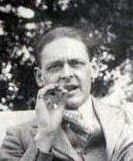The Waste Land and Other Poems by T.S. Eliot
Page 4 of 19 - 1 2 3 4 5 6 7 8 9 10 11 12 13 14 15 16 17 18 19 Purchase full notes for £5.95 (aprox $9.28)
By the time Eliot was writing The Hollow Men it was all over: ‘ Mr Kurtz – he dead !’ The ordeal is imagined in this poem as facing the ‘Eyes’ that once terrified Prufrock by ‘formulating’ him and making him sprawl ‘on a pin.’ The avoidance of direct eye-contact has left the hollow men in a hell of ‘whispers’ and strange rituals, while their thoughts constantly turn with regret to contemplate ‘Those who have crossed/With direct eyes/To death’s other kingdom.’ In other words, the time to accept the ordeal has passed forever, and Prufrock’s question cannot now be asked.
Christianity allowed Eliot to place his deepest faith in the ordeal (now specifically the cross). To undergo the painful pilgrimage was now the way to Easter joy and resurrection – ‘Shantih’ thrice indeed. It is remarkable, though, how little Eliot’s poetry actually changes. Simeon, in A Song for Simeon , is still ‘avoiding the ordeal’ wishing for a death that will free him from his fear of what he foresees in the future. The Magi, indeed, undergo the painful pilgrimage of ‘Birth and Death,’ but are denied the rewards of Easter and Pentecost, having returned to their own country where an alien people clutch at their old gods. Even the genuine sense of healing and renewal that comes in Marina is so attenuated and half-glimpsed that it gives little sense that Eliot had really conquered his demons, or even begun to come to terms with them.
None of this, of course, affects the great beauty of Eliot’s writing – indeed his pain is most probably what afforded him such creativity. Vivienne, not Valerie, was the muse, and, having achieved a degree of happiness, Eliot found it impossible to write much of significance in his later years. The poet who wished to be invisible stands, ironically enough, revealed in his works in all the disorder and tragedy of his life.
A Biographical Note.
The facts of Eliot’s life may be well known, but a brief summary of them is given here for those who are unfamiliar with the story.
Thomas Stearns Eliot was born in St Louis, Missouri, into a New England family. He went to Harvard in 1906, where he was influenced by the academic reaction then underway to the Romantic movement; he also imbibed an enthusiasm for Elizabethan and Jacobean literature, early Italian poetry (especially the work of Dante) and Indian mystical philosophy. Later, he studied in France and Germany, then went to England just before the War in 1914.

